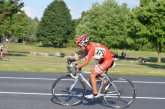| » View all news titles |
» View titles this week |
» View titles this month |
The 5-year-old cried and sputtered as the invasive swab went up her nose to the back of her throat. Her first coronavirus test.
“It’s a lot of emotional turmoil as a child to have to go through that fear,” Jessica said. “The COVID testing really impacted (her).”
Julia has a rare form of eye cancer called retinoblastoma. Since she was diagnosed three and a half years ago, the disease has taken her right eye and she's lost 70% vision in her left. For children like her and their families facing cancer, the pandemic has made the challenges of diagnosis all the more daunting.
The coronavirus test is now something Julia must endure with every doctor's visit. If the results come back positive, the doctors won't perform exams under anesthesia and she can't receive treatment. Jessica thanked God the results have been negative.

Since October 2016, Julia's family has traveled from Wisconsin to New York City every four weeks for her tests and treatments. The trip usually takes no more than a weekend, flying back and forth by plane, but after the coronavirus outbreak the family now makes the 17-hour drive.
“The whole way to get there was incredibly challenging for our family,” Jessica said. “It’s expensive. More gas, more hotels.”
New COVID-19 hospital rules mean only Jessica can accompany Julia for her test. She put a brave face on for her daughter, but wished her husband was by her side holding her hand when doctors told her in early April Julia’s cancer was still there.
“It helps, our hands together. But we don’t have that now,” Jessica said. “It’s almost like a new diagnosis, you’re trying to figure out how to do this.”
“My takeaway from all of this is that we all need to be creative and flexible right now all while keeping in mind the best interest of the patients,” he said. “And the best interest of the patient factors in their cancer treatment, but also keeping them COVID-free.”

One of his patients, 6-year-old Lakelynn Markham, was diagnosed with a rare cancer three years ago. She became a candidate for a clinical trial after doctors discovered her tumor was pressing on critical nerves in her neck, disqualifying her from surgery.
Before the pandemic, she traveled from North Carolina to Boston to see Dr. DuBois. Now she sees new doctors at a Duke University center and receives her treatment through a courier overnight.

Her mother, Leslie, says the changes have been hard. She remembers Lakelynn crying at the prospect of going to a new center and not seeing her favorite nurses or Dr. DuBois in Boston.
“Kids at this age, when they’re going through any type of medical trauma or something different, keeping the same routine is extremely important,” she said.
Leslie took her daughter out of school early on in the outbreak and self-quarantined the family before businesses began closing. Lakelynn was accustomed to traveling with a mask, gloves and antibacterial wipes even before COVID-19. Even though she understands why she has to stay indoors, Leslie says it breaks her heart watching her stare out the window as her friends play outside.
“I think it’s confusing,” Leslie said. “She can’t hug her Nona, she can’t play with cousins … Nobody is sick in our family but we still can’t play with them.”

As the pandemic puts additional emotional and financial strain on families contending with childhood cancer, some are looking to organizations like Alex’s Lemonade Stand Foundation. It set up a dedicated COVID-19 fundthat so far has raised $180,000 and helped more than 600 families.
ALSF also has located and provided masks, gloves and antibacterial wipes for families who can’t find them at local stores.
“It’s a seemingly small thing, but it’s those small things that are really big things to families,” said Liz Scott, co-executive director of ALSF and mother of its founder, Alex Scott. “Sometimes it’s just that hand you need that somebody reached out to you at the right time to make you feel hopeful.”
While driving to New York, Jessica Malicki relied on the foundation to help pay for the hotel, gasoline, groceries and other travel costs. Although she’s used to a certain level of anxiety as a parent of a child with cancer, she’s grateful the foundation has relieved some of the financial burden so she can focus on Julia.

As they navigate a new normal, momsLeslie and Jessica both say the coronavirus pandemic has put others in their shoes.
“You’re worried about something invisible, you’re worried about something you can’t see.” Jessica said. "Everybody is learning what it's like to be a cancer parent."

